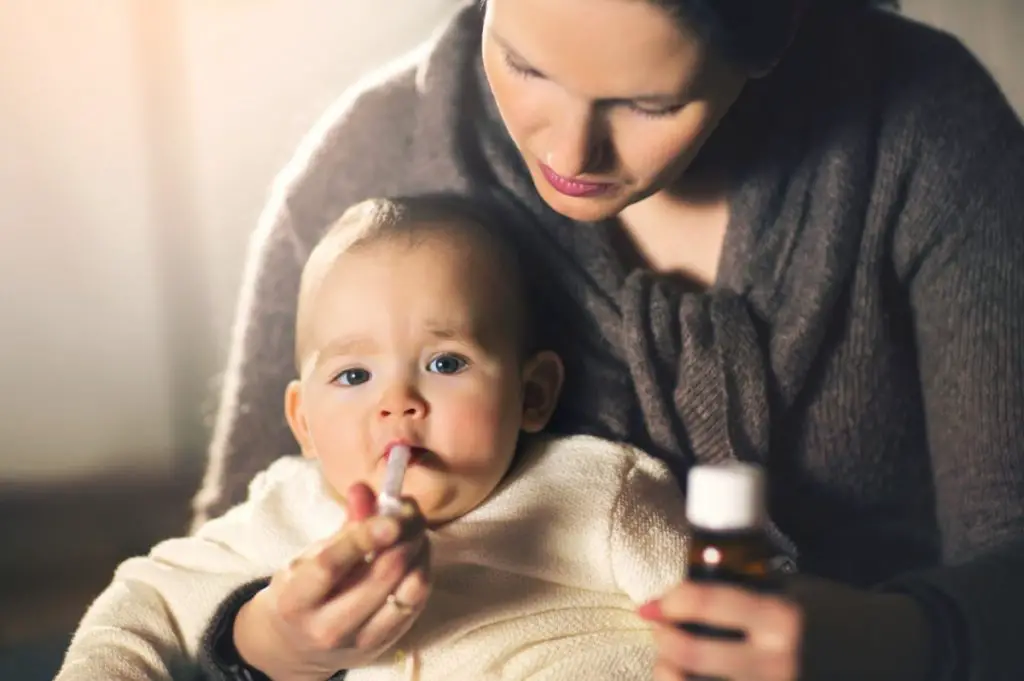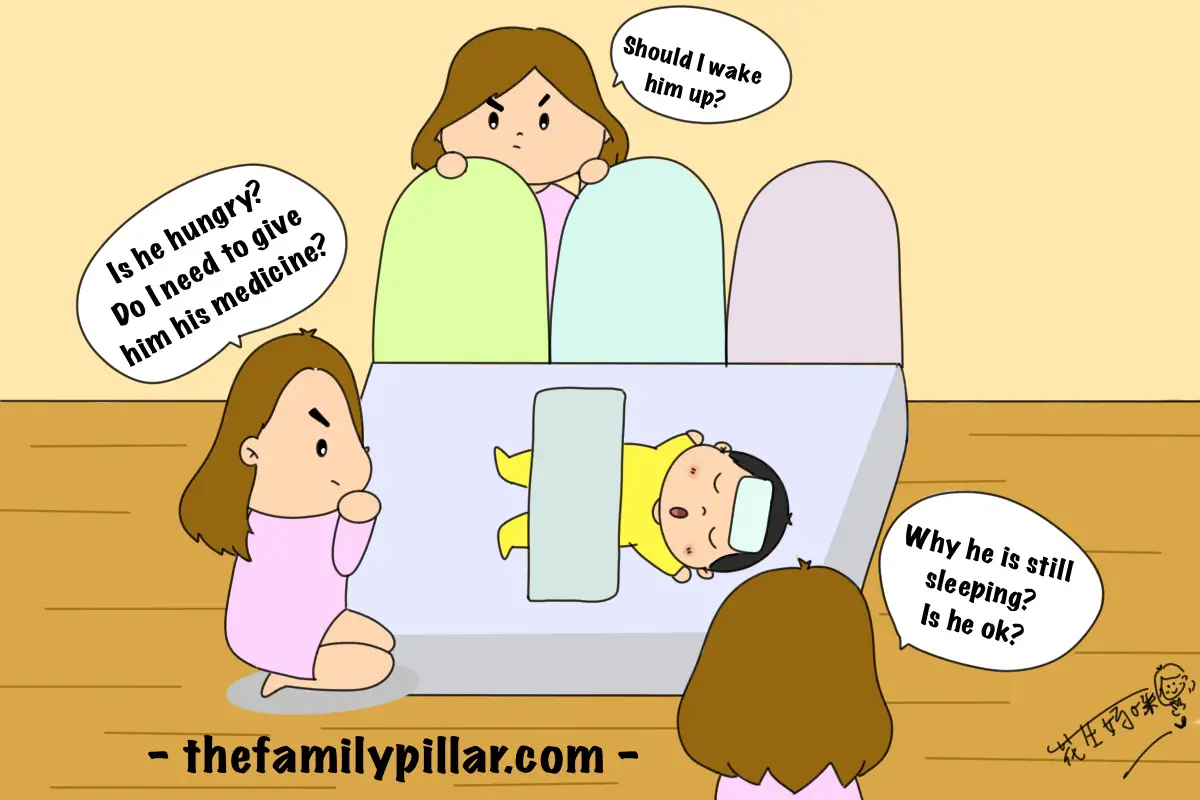My biggest fear is when my baby falls sick, more so when I was a new mom. Sometimes we just don’t know what to do, and bringing him to a doctor can be difficult without a helper. Babies also tend to sleep more when they are sick, but should you let him sleep all day? Here’s what I have learned when taking care of my sick baby.
You should let your sick baby sleep as long as he needs, but make sure to monitor his breathing and that his body temperature is below 99.5°F (37.5°C) if measured orally. If he sleeps for too long, you should wake him up to feed him. Make sure he stays hydrated and well-fed.
Let’s take a deeper look at the details, like how often should you wake your baby for feeding, or whether you should wake him up when it’s time for his medication, and some other related issues.
How often should you wake your sick baby for feeding?
I mentioned earlier that it’s ok to let your baby sleep as long as he needs, but feeding must continue. In this context, feeding means milk intake, be it breast milk or formula milk. If he doesn’t feed properly, then he will not be properly hydrated. Timely feeding will also help your baby recover quicker.
Depending on your baby’s age, this is how often they need feeding.
| Baby's Age | Feeding Frequency | Quantity |
|---|---|---|
| Newborn baby | On demand or Every 2 to 3 hours, that's around 8 to 12 feeding every day. | Around 1 to 2 ounces of milk each feed. |
| 2 months old | Every 2 to 3 hours. | Around 2 to 4 ounces of milk each feed. |
| 4 months old | Every 2 to 3 hours. | Around 3 to 4 ounces of milk each feed. |
| 6 months old | Every 3 to 4 hours. | Around 4 to 5 ounces of milk each feed. |
By six months, your baby should start eating solid food. With the introduction of solid food, the frequency and quantity in feeding will gradually decline. The frequency may start to vary based on the number of meals or snacks he has. At this time, you can also start to introduce sips of water to him, starting from 2oz of water throughout the day at six months old. Generally, this is how much they need.
| Baby's Age | Feeding (Milk Intake) Frequency | Quantity | Suggested Frequency In Feeding Solid Food |
|---|---|---|---|
| 6 months old | Every 3 to 4 hours | Around 4 to 5 ounces of milk each feed | 1 meal |
| 8 months old | Every 3 to 4 hours | Around 4 to 6 ounces of milk each feed | 2 meals with snacks in between |
| 10 months old | Every 3 to 4 hours | Around 4 to 6 ounces of milk each feed | 2 or 3 meals with snacks in between |
| 12 months old | Every 3 to 4 hours | Around 4 to 6 ounces of milk each feed | 3 meals with snacks in between |
Just like you and I, your sick baby’s appetite will naturally decline. Do not be too alarmed if he is not having proper meals or as many meals as he would typically have. As long as his milk intake is right, he can still get the nutrients from breast milk/formula and continue to be well hydrated. The best indication is by checking his wet diapers as he should urinate like normal.
In short, meals with solid food can be reduced, but you should not reduce milk intake. Wake him up to breastfeed, or bottlefeed as keeping him hydrated is important.
Things to look out for when your baby is sick

It is always important that you monitor your baby’s sleep, even more so when he is sick. Here are some of the things that you should look out for, and if your baby shows these signs, take him to a doctor for further examination.
- Too drowsy but not taking medication that causes drowsiness
- Not responding to his name when called
- Non-stop vomiting
- Non-stop diarrhea
- Unusual stool color, especially if it is red or white
- Struggling to breathe
- Crying for a long period and cannot be consoled
- Allergic reaction to a medication
- Sudden fever spike
Always trust your gut feeling. You and I, as parents, have the instinct to know when something is not right with our babies and when it’s time to seek medical assistance.
There are a few ways to measure body temperature, here are the common ones with their temperature chart to help you know if you should visit the doctor. You should bring him to a doctor when the temperature exceeds this.
| Measurement Method | Normal Temperature Range |
|---|---|
| Armpit | 97.8°F - 99.5°F (36.5°C - 37.5°C) |
| Mouth | 95.9°F - 99.5°F (35.5°C - 37.5°C) |
| Ear | 96.4°F - 100.4°F (35.8°C - 38°C) |
| Rectal (Bum) | 97.9°F - 100.4°F (36.6°C - 38°C) |
If your baby is below 3 months old, bring him to visit the doctor immediately when he’s showing signs of fever, his immune system is not developed yet and may not always be able to fight off infections. [source]
For babies older than 3 months old, it’s normal for the fever to stay up to 3 days. My doctor usually asks me to go back and continue monitoring if his temperature doesn’t reach 102°F (38.9°C).
If his fever doesn’t go higher than this and doesn’t stay longer than three days, I won’t bring him to the doctor because it’s a waste of time and money. The doctor always asks me to go back and monitor, and he gets well on his own after that. That said, if it worries you, just bring him to the doctor, trust your instincts 🙂
Should you wake your baby to give medicine?

When the doctor prescribes medication for my baby and instructs that he must take it at a specific time, I struggled between whether to wake him up or to let him continue his sleep. This dilemma is especially true when he finally manages to fall asleep!
From my own experience, I find that it is better to let my baby sleep as much as he needs and then feed him the medicine when he wakes up. I will then start to count from that time to determine when he should take the next meds. Keeping a time log will be helpful, especially if you have more than one sick baby or a few medications to keep track of.
Sleep can, among many other things, help your baby’s body to repair itself. [source]. Furthermore, sick babies experience discomfort and will have disrupted sleep, especially night time, due to various reasons. So, if your baby can sleep longer and is taking more naps, let him sleep so that his own body can fight the sickness. This way, he is also building up his immune system for better resistance.
Should you maintain a routine while your baby is sick?
Your child must have a routine for him to make sense of his entire day, and for him to have a sense of security and normalcy in his daily life. You may already have a routine established for him, such as:
- Naptime; bedtime
- Mealtime; snack time; feeding time
- Bath time
- TV time
- Playtime; outdoor playtime
- Quiet time, reading time
- Family time
- Cleaning-up time
But now that your baby is sick, should you still maintain his routine? My suggestion would be to drop the routine or bend it a little bit temporarily. Be flexible and do what is best for you and your sick baby.
Sleep as much as possible, or have as much family bonding time or cuddling time as possible, whichever gives the best comfort to you and your sick baby. You may even add something special like a long warm bath with bubble play for your baby.
Routine can be readjusted when your baby is well again. Besides, routine changes as your baby grow. A newborn does not have TV time or meal/snack time, but a toddler will have more routines incorporated in his day as he learns to be more independent. So it’s ok to drop or bend the routine a little bit.
Does that mean you have to forgo all plans made for the day and just stay home?
It’s already difficult to make plans with your baby around, and it just gets complicated when he is sick. Should you proceed with your plans, or should you delay them? Here are the three things I suggest you consider before making your decision.
1. How young is your baby?
The younger the baby, the more he is prone to contact other viruses out there. This is especially true for babies in the first 3 months of life.
2. How serious the sickness is?
This question should go hand in hand with the 1st question, and with all other factors taken into consideration, for example:
If your baby is 4-months-old and has a temperature of 38°C (measured orally), it is considered to be more serious than a 3-year-old who has the same temperature but is active and still going about his daily activities as per normal.
If your baby is having teething symptoms (drooling, mouthing things, swollen gums) and is having fever, compared to a toddler who has viral fever symptoms (cough, runny nose, sore throat, and fever). The latter is considered to be more serious as it may spread to others or his siblings.
Also, considering that he is suffering from more than one sickness and discomfort in different parts of his body.
3. How much help will you be getting?
This question is crucial for your own mental and physical health. Taking care of a sick baby takes a toll on your body because your sleep is interrupted. You need to wake up constantly at night to check on your baby. Your baby’s recovery period can take between a few days to a few weeks.
Do note that a sick baby will want and need lots of cuddles, hugs, and carrying around from you. It is his way of finding comfort, and he will want it from his parents, especially from his mother. The familiar heartbeat that he hears throughout the pregnancy brings comfort and security.
After considering the 3 points above, I will most likely forgo my plans to go out and prioritize the recovery of my baby. It may be a good idea to delegate what you need to do to someone else, that way you can stay at home and take care of your baby.

